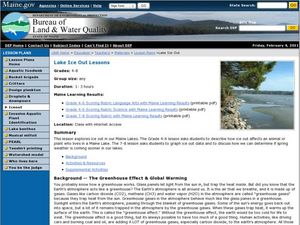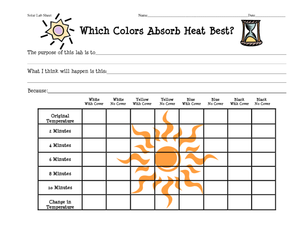PBS
Population Simulation with M&M's
Math and M&Ms® go great together when introducing a modeling activity. Allow your learners to simulate population growth and decay of fish in a pond and share their reasoning for the change in fish. With such an impact we have on our...
Curated OER
Time and Cycles - Dendrochronology
Middle schoolers investigate the lives of trees by examining ring cycles. In this plant life lesson plan, students identify the field of study known as dendrochronology and discover its history. Middle schoolers investigate a...
Curated OER
The Seed Connection
Second graders investigate the best conditions for growing plants while considering how math, science, and technology are interrelated in this study. They partner with an upper grade through the use of the Internet and conduct a...
Curated OER
Greenhouse Effect: Pop Bottle Experiment
Students explore global warming by conducting a weather experiment. In this greenhouse gas lesson, students define the greenhouse effect and the impact on our ozone layer. Students utilize a soda pop bottle, floodlight bulb, thermometers...
Alabama Learning Exchange
WATER You Doing to Help?
Auntie Litter is here to educate young scholars about water pollution and environmental stewardship! Although the 15-minute video clip is cheesy, it's an engaging look at the water cycle and conservation. Learners start by illustrating...
Curated OER
Lake Ice Out Lessons
Students explore the greenhouse effect. In this environment instructional activity, students describe how "ice out" affects animals and plants who live in a Maine lake. Students graph "ice out" data and make predictions about...
Curated OER
Are You Thirsty? The Effects of Pollution on Drinking Water
Discuss the availability of clean, plentiful water and the causes of water pollution. In groups, sixth graders discuss problem-solving methods for keeping water clean. They explore the function of water treatment plants and perform...
Curated OER
How Does Your Garden Grow?
Students create a design for a school garden. In this garden design lesson, students analyze what plants grow best in their school's climate and work in teams to design a garden. Students measure the existing space, determine the...
Curated OER
Windsor Opposes Waste - WOW!
Students participate in paper recycling. They are taught to environmental awareness of recycling and its importance in their future. Students discuss and identify the problems of how they can minimize waste. They brainstorm suggestions...
Curated OER
Cooking with the Sun!
Learners access prior knowledge of solar energy and understand that solar energy produces heat. In this solar cooker lesson, students complete grade appropriate experiments using the heat of the sun. Learners complete a worksheet on...
Curated OER
Web of Life
Young scholars construct a web of life. In this ecosystem lesson students are introduced to ecosystems and life cycles. Insects are the main focus.
Curated OER
Compost in a Bag!
Fourth graders experiment to see which objects decompose. In this compost lesson, 4th graders observe the changes of labeled objects in a bag. Leave the objects for one month and record the changes by observation and weight. Students...
Curated OER
Tracking the Wild Ones
Students apply mathematic skills to discover the extent of the concern for endangered species. Students analyze graphs and look for trends in graphed results of endangered species on a global level.
Curated OER
Beach Zonation
Students identify and separate the different zones of the beach by observation. They investigate beach zonation by gathering and comparing sand samples gathered from different areas of the beach.













